Alienware 17 Gaming Notebook Review
by Dustin Sklavos on September 6, 2013 12:00 PM ESTWe're starting to get a bit more of a feel for how Haswell performs on the CPU side. The Intel Core i7-4800MQ powering the Alienware 17 is undoubtedly one of the fastest mobile quad core CPUs, but the more testing I see with it, the more I get a distinct sense that we need to start digging deeper into how it handles turbo. Performance is complicated further when we start hitting the GeForce GTX 780M as well; NVIDIA has implemented boost clocks on their mobile part, but the boost range seems to be a lot more variable than it is on the desktop, probably owing to the more specific thermal headroom.
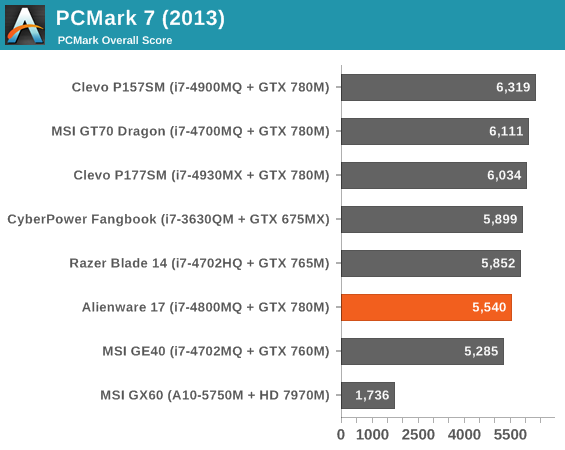
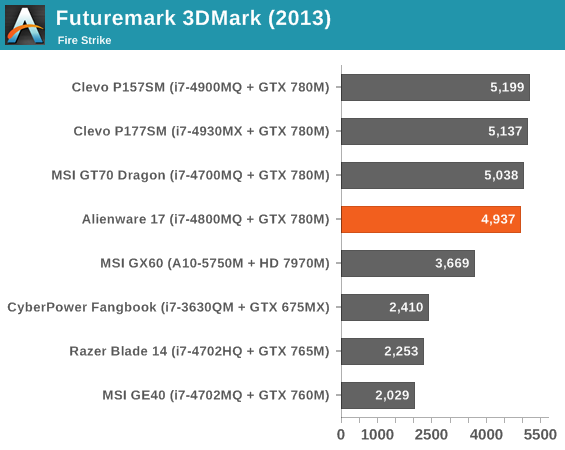
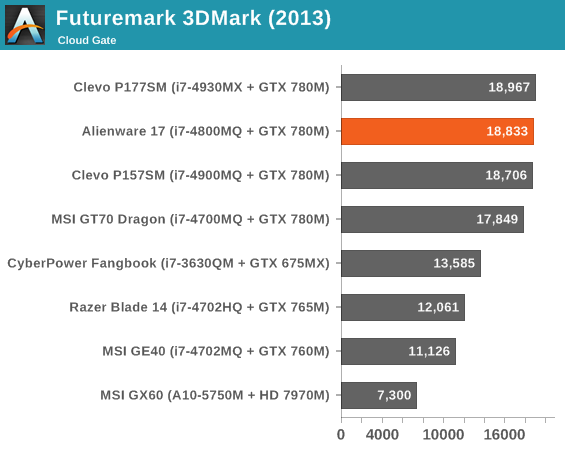
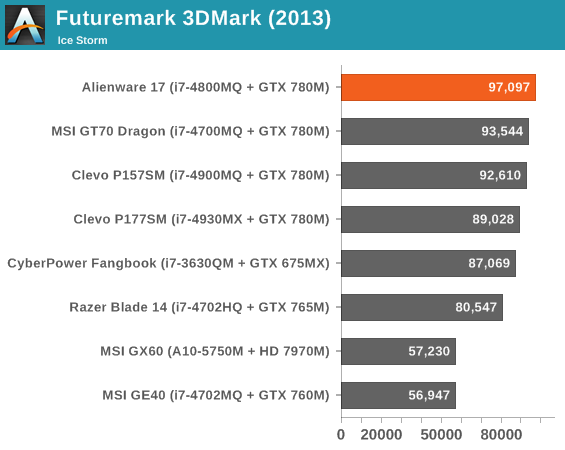
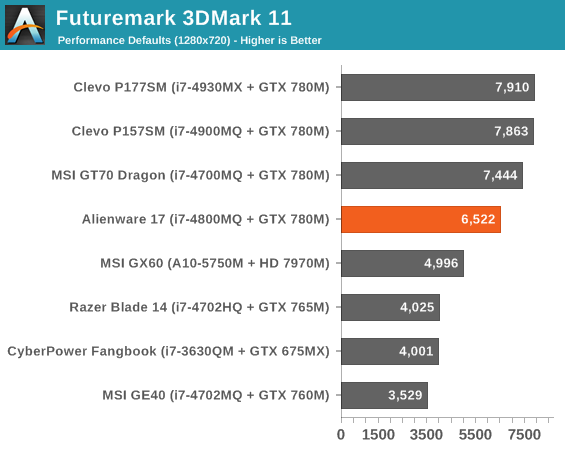
You can see we've got four different Haswell and 780M systems on hand, and the 3DMark scores are bouncing all over the place. I'd been expecting and hoping that the Alienware 17 would have the cleanest and most consistent implementation of this hardware pairing, but that doesn't seem to be the case. Instead we're all over the map. The 3DMark11 score is remarkably low compared to the other 780M systems, but it remains to be seen whether or not that performance deficit will resurface in practical game testing.
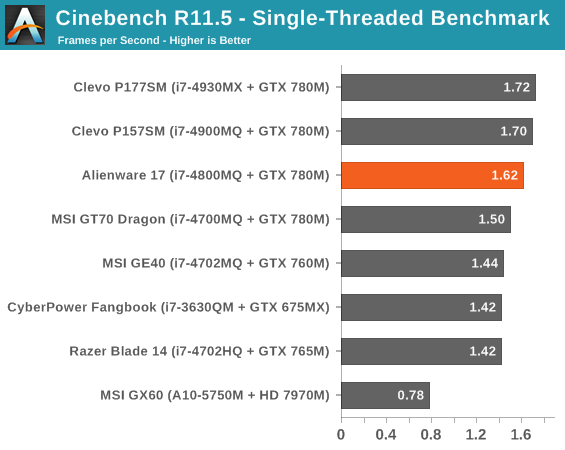
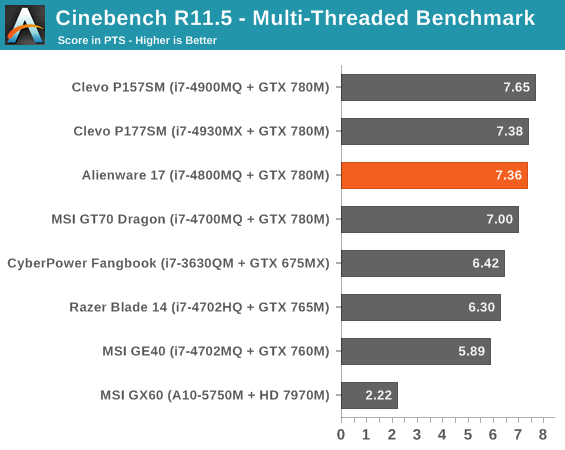
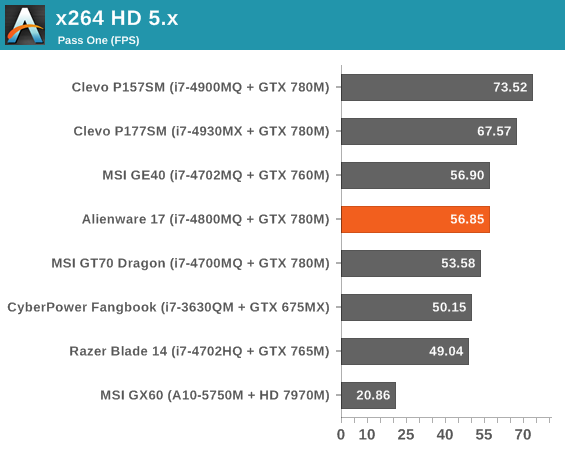
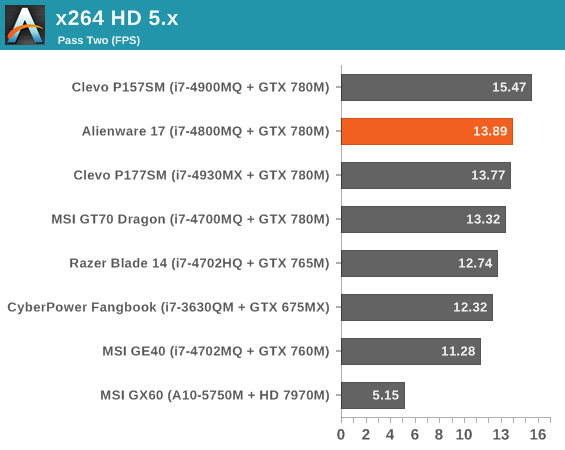
Cinebench is able to give us consistent results due, I think, to its more sustained load. Cinebench has historically been very consistent in the first place, so everything falls in where it ought to. But the x264 encoding benchmark is completely different.
We're essentially dealing with a lot of performance variables now. At first blush, Haswell seems to be more granular with its performance scaling than Ivy was. Mobile Kepler with boost is also very granular, but my experience with Kepler on the desktop is that its boost clocks are governed entirely by thermals. On the desktop, thermally-controlled turbo/boost speeds on hardware are easy to control for, but when you're talking about notebooks, you're at the mercy of the cooling systems implemented by the manufacturer, including the fan profiles.










45 Comments
View All Comments
ddriver - Friday, September 6, 2013 - link
What defines being the "king"? I guess it is not performance, since there appear to be faster products?nathanddrews - Friday, September 6, 2013 - link
... and not styling, since Alienware tends to build the ugliest notebooks without fail. That alien head just looks dumb, always has. That is my opinion.edwd2 - Friday, September 6, 2013 - link
Well, it‘s designed for usually immature, enthusiast gamers who probably would think of it as cool anyway.bad_code - Monday, September 9, 2013 - link
Must be plenty of immature gamers out there because most people I see are impressed with the looks and lights. Many are older and lots of them younger.Wolfpup - Tuesday, September 10, 2013 - link
It's designed for people that want an actual high end notebook (remember those?) that's reliable and can actually be pushed without dying.macov44 - Sunday, September 8, 2013 - link
Their success proves you are wrong.Panickd - Friday, September 13, 2013 - link
Both Voodoo (tragically bought by HP) and Falcon Northwest were better builders of gaming laptops that Alienware ever was (even before Dell came sniffing around). If I have the money to spend I am spending it with Falcon Northwest everytime. Smaller vendors tend to have a handle on what their buyers want and are more attentive when it comes to service. Plus getting a laptop painted any color you want is just hyper-cool.Kumouri - Friday, September 6, 2013 - link
I believe in general the king of products would be the one that sells the best, that the most people have.ddriver - Friday, September 6, 2013 - link
Dunno... to me "king" also implies exclusivity, rarity, premium that is usually not the best selling product most of the people have.kogunniyi - Friday, September 6, 2013 - link
Durability, fit-and-finish, features, and cooling, I imagine. It's not so much that Alienware is particularly competent as that the competition is incompetent.